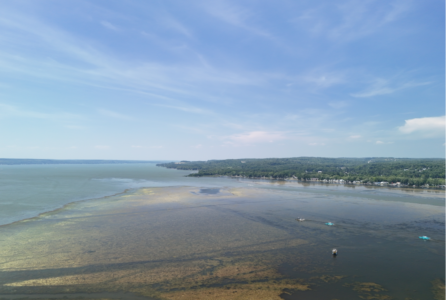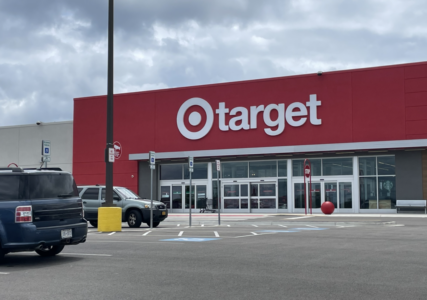Meet The Candidates For Jamestown City Council Ward VI
- Vanessa Weinert
- Andrew Faulkner

Vanessa Weinert
The candidates running for Jamestown City Council Ward-6 are incumbent Republican Andrew G. Faulkner and his opponent Democratic candidate Vanessa Weinert.
Faulkner, by trade, is an electrician and previously owned a screen printing shop. He is a graduate of Jamestown High School and is endorsed by the Republican and Conservative parties. He currently sits on the Public Works Commission and the Parks, Recreation & Conservation board.
Weinert is the Democratic challenger for the City Council’s Ward 6 seat. Weinert was elected to Jamestown City Council in 2018. Also, she sits on various boards and worked previously as an anti-violence educator.
Post-Journal: Is there one recurring theme you’re hearing from voters as you go door-to-door? How do you think the council can best address those voters’ issues?
Faulkner: Caring for our residents and their concerns is at the heart of my commitment to Jamestown. Recently, the primary concern voiced by our residents revolves around housing issues and code violations, which I address below. So, I will move on to the second most prevalent concern, city infrastructure. We need to focus on proactive solutions.

Andrew Faulkner
In Ward Six, we face unique challenges, especially in areas prone to flooding due to a wide variety of issues such as clogged drainage and beavers building dams where they shouldn’t. To address these issues effectively, we need a proactive approach. Identifying potential problems before they escalate and implementing maintenance plans is key. By doing so, we can prevent major problems from arising in the first place. During my conversations with residents on Barrows Street, it became evident that they, along with others, feel neglected.
No resident should ever feel ‘forgotten about’ in our community. We must prioritize addressing the deteriorating infrastructure, including the roads and curbing as seen on Barrows Street and other areas. Achieving financial stability for our city is pivotal. With improved financial health, we can allocate resources more effectively. This means investing in the maintenance and enhancement of our city’s infrastructure, ensuring that no resident is left feeling neglected. Together, we can create a Jamestown where every neighborhood thrives, and every resident feels valued and heard.
Weinert: During my recent interactions with residents while canvassing, a common concern that I’ve come across is the overall quality of life in our city. People are expressing a desire for cleaner, safer and more vibrant neighborhoods. To address these concerns, it is crucial for the city council to maintain its focus on enhancing public safety through support for local law enforcement and community programs. These initiatives align with Mayor Sundquist’s vision for our city, and he has made significant strides in developing and implementing a community-centered public safety plan. Furthermore, investing in our parks and recreational facilities is another essential step to improve the well-being of our residents. It is imperative that we actively engage with the community, seek their input and foster collaboration to ensure that their concerns are effectively addressed.
Post-Journal: Homelessness, affordable housing and code enforcement have long been identified as growing problems in the city. What actions do you think the city and the council should take to address these problems?
Faulkner: Addressing the issues of homelessness, affordable housing, and code enforcement requires a comprehensive approach that involves collaboration between the city, local organizations, and the community. For the homelessness issue we should not just continue but expand our collaboration with local social service agencies and nonprofits. By helping provide essential support services such as mental health counseling, addiction treatment, and job training, we can empower homeless individuals to reintegrate into society successfully. Regardless of our past efforts, it’s imperative that we continue to pursue progress on the challenges we face. As a testament to this commitment, the Council recently approved funding for the construction of a women’s shelter in our city, addressing one of the pressing needs identified by our community.
In terms of code enforcement, we need to continue to be proactive. We must explore ways to streamline and enhance our processes for code inspections, ensuring that all properties meet the highest standards of safety and habitability. A significant step in the right direction has been the recent change in the city charter, enabling our code enforcement officers to issue tickets for specific violations. This change not only represents progress but also serves as a solid foundation upon which we can build. By addressing common violations and ensuring strict adherence to codes, we are laying the groundwork for a safer, more secure Jamestown.
Weinert: Homelessness, affordable housing, and code enforcement are indeed urgent challenges in our city. Strong, healthy neighborhoods form the bedrock of a thriving community, offering secure, clean, and inviting environments for families to thrive. To confront these issues, it is essential for the city and the council to work in tandem on the comprehensive “Better Housing for All” plan. This plan targets issues like blight, affordable housing, expanding the 19A program, promoting homeownership, and community-driven public safety. While there is still much work to be done in refining and implementing the specifics of the “Better Housing for All” plan, it represents the crucial first step in addressing one of Jamestown’s most pressing concerns. We need a city government that can work together cohesively to make tangible progress in the housing realm.
Post-Journal: Eight buildings were identified as key redevelopment opportunities in the Urban Design Plan. Three of those parcels have found new tenants, while five are largely unchanged – the Furniture Mart building, Viking Building, Key Bank Building, the former Craft World and Action Hobbies building on Third Street and storefronts in the Hotel Jamestown. Are you satisfied with the progress made in new futures for those buildings over the past five years and how can the council stimulate development in those areas?
Faulkner: Again, we must always strive for continuous progress, recognizing that there’s perpetual potential for improvement in addressing the challenges our city faces. To invigorate development citywide, including these specific locations of concern, collaboration between the city council, administration, and Department of Development is key.
Firstly, let’s illuminate the path to progress by showcasing our successes. By spotlighting the renovated vacant buildings, we can set shining examples that inspire property owners and developers alike. These success stories not only ignite creativity but also underline the economic and social advantages derived from these transformations.
Additionally, fostering Public-Private Partnerships can significantly benefit our city. Cultivating relationships with private developers and providing them with incentives can encourage investment in revitalizing vacant properties. By aligning these developments with our community goals, we not only enhance our urban landscape but also create a harmonious synergy between public and private interests.
Weinert: The progress achieved in redeveloping these crucial buildings over the past five years has generally been positive, but there is still more work ahead. Our city is still recovering from the economic impacts of a global pandemic, and I must acknowledge the resilient response of our city government during this challenging period. However, this situation has affected investments in new businesses and altered consumer behavior. I am encouraged by the presence of new tenants in three of these buildings, and I firmly believe that the city council can further stimulate development in the remaining areas by providing incentives to attract businesses and investors. We should explore opportunities for public-private partnerships and reach out to existing business owners interested in expanding their operations. Additionally, Mayor Sundquist’s and the BPU’s efforts to offer broadband as a public utility serve as a valuable incentive for new development. It is our duty to create an environment that nurtures innovation and encourages growth in these areas.





